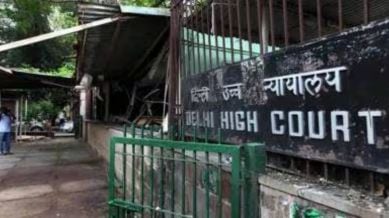Stay updated with the latest - Click here to follow us on Instagram
Is Parliamentarian separate category to common man: Delhi HC to Baramulla MP Engineer Rashid
Rashid has filed a plea seeking waiver of his custody parole condition, which requires him to foot the bill for travel and security expenses for attending the Parliament

Hearing independent Baramulla MP Abdul Rashid Sheikh alias Engineer Rashid’s plea seeking waiver of his custody parole condition, which requires him to foot the bill for travel and security expenses for attending Parliament, the Delhi High Court on Wednesday orally inquired if a parliamentarian can be treated separately from the common man.
Questioning if Rashid’s plea can even be entertained as a modification application instead of a plea seeking review, the division bench of Justices Vivek Chaudhary and Anup Bhambhani orally expressed that changing the condition will change the very nature of the order by which he was granted custody parole to attend Parliament.
In March, the Delhi HC in its order had granted custody parole to Rashid, subject to him bearing the costs that will be incurred in travel and security arrangements from the jail to the Parliament and back.
While senior advocate N Hariharan, appearing for Rashid, stressed that he is seeking only a modification of this order, the bench expressed orally that it appears to be a plea seeking review.
Justice Chaudhary orally remarked, “We granted you custody parole with conditions… I strongly believe this is a review… Order (of HC in March) clearly notes that there is no right of an MP to attend Parliament… changing the conditions changes the entire order… Our difficulty is… either give us an SC judgment (showing a precedent) that he (as an MP) has a right to attend Parliament, or else let this issue be decided by SC.”
Justice Bhambhani concurred. “As far as I understand, parliamentarians are not put into any separate category as far as criminal law is concerned… are bails, paroles going to be treated separately? Can custody parole be free for an ordinary person? What we say here will be cited before us,” he orally remarked.
While Hariharan argued that as an MP, Rashid discharges his public duty of representing the people of his constituency, his counsel sought time to respond to the court’s queries.
The bench has now kept the matter for further consideration on August 12.
In March, the Delhi HC, while allowing Rashid to attend Parliament during the Budget session, had imposed the condition that the expense for his travel to Parliament while in the court’s custody, accompanied by police, and other arrangements shall be borne by him.
The jail authorities had estimated a cost of approximately Rs 1.45 lakh each day for travel and travel-related arrangements, costing Rashid Rs 8.74 lakh for attending six days of the Parliament.
At the time, he had challenged the condition where he had to bear the costs before the HC. Subsequently, he had submitted that he is ready to deposit 50% of the total cost.
Recording Rashid’s submission, the HC had directed that he shall be allowed to attend the Parliament after depositing the amount.
In July, a Delhi court granted custody parole to Rashid from July 24 to August 4 to attend the Monsoon Session of Parliament. Before the trial court, Rashid had urged that he should either be granted interim bail or permission to attend Parliament in custody, without payment of travel costs, as he was seeking to attend Parliament as his public duty and not for personal work. Additional Sessions Judge Chander Jit Singh had, however, imposed travel costs on him, taking the March HC order into consideration.
Rashid, who defeated Jammu and Kashmir Chief Minister Omar Abdullah in the Baramulla seat by over 2 lakh votes in the 2024 Lok Sabha polls, has been lodged in Delhi’s Tihar Jail since 2019 in the case of alleged terror funding.
He was arrested under the Unlawful Activities (Prevention) Act. According to the National Investigation Agency (NIA), he used various public platforms to “propagate the ideology of separatism and secessionism”, was closely associated with various terrorist organisations, and wanted to “legitimise” the United Jihad Council, a platform of anti-India militant groups in Jammu and Kashmir.
On May 30, 2017, the NIA registered a case against Lashkar-e-Taiba founder Hafiz Saeed and other “secessionist and separatist” leaders who, according to the agency, “received and collected” funds through hawala channels in “connivance with active militants of… terrorist organisations Hizb-ul-Mujahideen, Dukhtaran-e-Millat, Lashkar-e-Toiba” to fund “terrorist activities” in Jammu and Kashmir. Rashid was booked as part of this case.
A special NIA court in Delhi had framed charges against Rashid in March 2022.